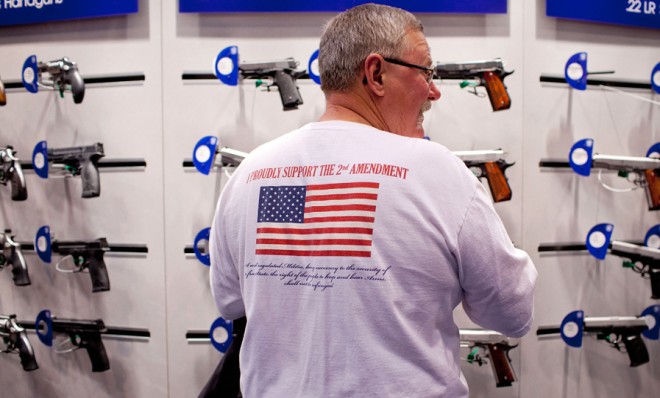Why gun owners fear the United Nations
The NRA isn't happy about the U.S. signing an international arms control treaty

A free daily email with the biggest news stories of the day – and the best features from TheWeek.com
You are now subscribed
Your newsletter sign-up was successful
Most of the world is watching Secretary of State John Kerry to see how his scheduled meeting with the Iranian foreign minister goes.
The National Rifle Association, however, is more concerned about a treaty Kerry signed today. The United Nations Arms Trade Treaty (ATT) sets standards for cross-border sales of everything from small arms to attack helicopters, with the goal of making sure they don't end up in the hands of criminals, human rights abusers, and terrorists.
So what does that have to do with American gun owners?
The Week
Escape your echo chamber. Get the facts behind the news, plus analysis from multiple perspectives.

Sign up for The Week's Free Newsletters
From our morning news briefing to a weekly Good News Newsletter, get the best of The Week delivered directly to your inbox.
From our morning news briefing to a weekly Good News Newsletter, get the best of The Week delivered directly to your inbox.
Plenty, according to a statement released by Chris Cox, executive director of the NRA's Institute for Legislative Action, shortly after the signing:
The Obama administration is once again demonstrating its contempt for our fundamental, individual Right to Keep and Bear Arms. These are blatant attacks on the constitutional rights and liberties of every law-abiding American. The NRA will continue to fight this assault on our fundamental freedom. [via Reuters]
Rep. Mike Kerry (R-Pa.) echoed that sentiment in a statement, saying that the ATT "outrageously forces the United States — the world’s most important defender of peace and democracy — onto equal footing with the world’s worst dictatorships and terror-sponsors."
Conservatives have a long and colorful history of distrusting the United Nations. Last year, Republican senators voted down a U.N. human rights treaty based on the U.S. Americans with Disabilities Act because, in the words of Sen. Jim Inhofe (R-Okla), it gave too much power to "overzealous international organizations with anti-American biases that infringe upon American society."
A U.N. climate deal in 2011 was derided on Fox News as a way to force the United States to pay "reparations" to poor countries. Glenn Beck even wrote a novel, Agenda 21, about a dystopic future in which people live in "ubiquitous concrete living spaces" and have their babies taken away at birth after "the worldwide implementation of a U.N.-led program called Agenda 21."
A free daily email with the biggest news stories of the day – and the best features from TheWeek.com
As for the arms treaty, chain emails were circulated as early as 2009 warning that Obama would use the U.N. to "force gun control and a complete ban on all weapons for U.S. citizens."
Back in 2011, when an earlier version of the treaty was being considered, former U.S. Ambassador to the U.N. John Bolton claimed that "there is no doubt that the real agenda here is domestic firearms control.”
The treaty provides "no guarantee for individual rights" and would lead to "a national gun registry, licenses for guns and ammunition sales, universal background checks, and even a ban of certain weapons," Bolton and former Deputy Assistant Attorney General John Yoo wrote in The Wall Street Journal in April, when 193 nations approved the treaty. (The only countries that voted against it were Iran, Syria, and North Korea).
Around the same time, the conservative Washington Times published an editorial titled, "The U.N. is coming for your guns," which claimed that a "ratified treaty, with constitutional authority, could be interpreted in a way that any weapon made with foreign components — or that might some day be exported, or that affects the overall arms market — could be said to be part of 'international' trade."
Kerry was quick to dismiss such concerns, saying, "We are talking about the kind of export controls that for decades have not diminished one iota our ability in the United States as Americans to exercise our rights under the Constitution."
It's an assertion backed up by international aid groups. "Spreading such misinformation may help the National Rifle Association raise money and gain converts to its cause," wrote Amnesty International's Adotei Akwei in April, "but it has no basis in fact."
Liberals were less diplomatic when the ATT was initially approved. The Washington Post's Greg Sargent complained that "Republicans (and too many red state Dems) are letting their approach to a problem that continues to claim American lives be dictated by a group that is happy to traffic in strains of paranoia that rival U.N. black helicopter fantasies."
Ultimately, conservatives don't have much to worry about, seeing as U.S. ratification requires a two-thirds majority in the Senate — a threshold that, even with a Democratic majority, isn't likely to be met. Chalk up another victory for freedom.
Keith Wagstaff is a staff writer at TheWeek.com covering politics and current events. He has previously written for such publications as TIME, Details, VICE, and the Village Voice.